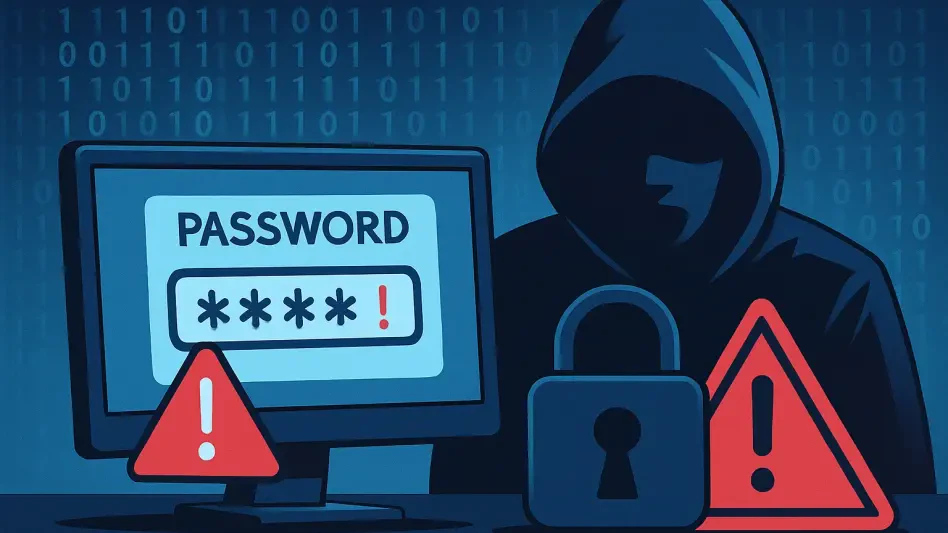In an era where digital interactions dominate daily life, the security of online accounts has never been more critical, yet countless individuals casually dismiss the nagging alerts about weak passwords that pop up on their screens. These seemingly minor notifications are often perceived as inconveniences rather than vital warnings, leaving users exposed to devastating cyber threats. Hackers, armed with increasingly sophisticated tools, can exploit simple passwords in mere seconds, turning a small oversight into a gateway for identity theft, financial loss, or reputational damage. The reality is stark: ignoring these prompts is not just a minor lapse but a risky decision that can unravel personal and professional lives. This article explores the hidden dangers of neglecting password alerts, the technology designed to protect users, and the severe consequences that can follow inaction, emphasizing the urgent need to take these warnings seriously.
The Hidden Risks of Weak Passwords
Unveiling the Vulnerability of Simple Credentials
The foundation of digital security often rests on the strength of a password, yet many users still rely on predictable combinations like “123456” or “password,” unaware of how easily these can be cracked. Cybercriminals employ advanced methods such as brute-force attacks, where automated tools systematically guess combinations, and dictionary attacks that target common words or phrases. Even more alarming is credential stuffing, where hackers use stolen login details from one breach to access other accounts. These techniques thrive on weak passwords, especially those lacking length, complexity, or unique characters. Once breached, an account can expose sensitive data—think bank details, personal emails, or corporate records—leading to consequences that ripple across every aspect of life. The ease with which these vulnerabilities are exploited underscores a critical truth: a flimsy password is akin to an open invitation for malicious actors to wreak havoc on unsuspecting victims.
Real-World Impacts of a Single Breach
When a weak password is compromised, the fallout can be catastrophic, extending far beyond a mere inconvenience. Financial fraud often tops the list of damages, with unauthorized transactions draining accounts before the victim even notices. Identity theft is another grim outcome, as hackers can impersonate individuals to secure loans or commit crimes in their name, leaving a tangled mess to unravel. Social media hijacking, while seemingly less severe, can result in personal embarrassment or the spread of harmful content under a user’s identity. For businesses, a breach might mean leaked trade secrets or disrupted operations, costing millions in recovery efforts. The time and emotional toll of reclaiming stolen accounts or repairing credit histories add another layer of burden. These real-world scenarios illustrate that the stakes of ignoring password strength are not abstract but painfully tangible, affecting both personal security and broader organizational stability in profound ways.
The Technology and Consequences of Ignoring Alerts
How Systems Detect and Warn About Weaknesses
Modern digital platforms are equipped with sophisticated mechanisms to identify and flag weak passwords before they become liabilities, offering users a crucial line of defense. Tools like the Have I Been Pwned API cross-check entered credentials against vast databases of leaked passwords, instantly alerting users if their choice has been compromised in prior breaches. Additionally, password strength algorithms evaluate factors such as length, the inclusion of numbers, special characters, and overall randomness to determine security levels. If a password falls short—perhaps it’s under eight characters or lacks diversity—the system triggers a prompt urging an update. Organizational policies often reinforce this by mandating regular password changes, ensuring accounts remain protected against evolving threats. These alerts are not random nuisances but calculated responses to real vulnerabilities, designed to shield users from preventable risks in an increasingly hostile digital landscape.
The High Price of Dismissing Critical Notifications
Disregarding weak password prompts can lead to a cascade of severe repercussions that are often underestimated until it’s too late to act. Cybersecurity experts liken this inaction to leaving a home’s front door unlocked in a high-crime area—an open invitation for disaster. Unauthorized access to financial accounts can result in significant monetary losses, while stolen personal data may fuel long-term identity fraud, a problem that can take years to resolve. Beyond individual harm, businesses face reputational damage and legal liabilities if client information is exposed through a preventable breach. Recovery processes are not only time-intensive but sometimes futile, as some damages—like leaked private communications—cannot be undone. The consensus among professionals is clear: these prompts serve as essential safeguards, and bypassing them heightens exposure to cybercrimes with outcomes that can disrupt lives and livelihoods in ways that are both immediate and enduring.
Final Reflections on Digital Defense
Looking back, the persistent issue of weak passwords revealed a glaring gap in user awareness that technology tirelessly worked to address through proactive alerts and sophisticated detection tools. The severe breaches that unfolded due to ignored prompts served as stark reminders of the vulnerabilities lurking in simple credentials. From financial devastation to personal crises, the stories of loss painted a vivid picture of what was at stake. Moving forward, the path to stronger digital security lies in embracing these warnings as vital protections rather than annoyances. Users must prioritize creating complex, unique passwords and adhere to system recommendations for regular updates. By integrating these practices into routine habits, the risk of falling victim to cyber threats diminishes significantly. Ultimately, safeguarding an online presence starts with a commitment to act on every alert, ensuring that the digital doors remain firmly locked against those who seek to exploit the smallest oversight.








